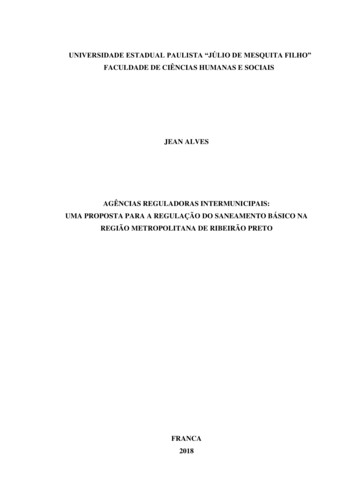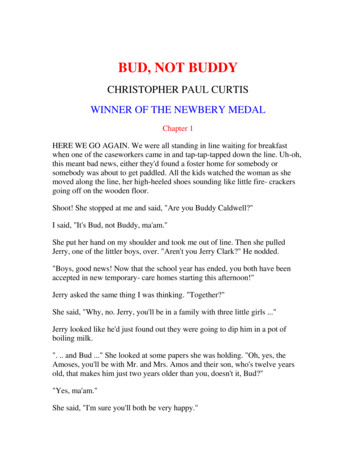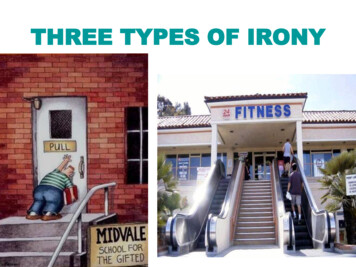
Transcription
Romiette and Julio
Books by Sharon M. DraperTears of a TigerForged by FireRomiette and Julio
First Aladdin Paperbacks edition April 2001Copyright 1999 by Sharon M. DraperAladdin PaperbacksAn imprint of Simon & SchusterChildren’s Publishing Division1230 Avenue of the AmericasNew York, NY 10020www.SimonandSchuster.comAll rights reserved, including the right ofreproduction in whole or in part in any form.Also available in an Atheneum Booksfor Young Readers hardcover edition.Designed by Lisa Vega.The text for this book was set in Bembo.Printed and bound in the United States of America2 4 6 8 10 9 7 5 3 1The Library of Congress has cataloged the hardcover edition as follows:Draper, Sharon M. (Sharon Mills)Romiette and Julio / by Sharon M. Draper.—1st ed.p. cm.Summary: Romiette, an African-American girl, and Julio,a Hispanic boy, discover that they attend the same high school afterfalling in love on the Internet, but are harassed by a gang whosemembers object to their interracial dating.ISBN: 0-689-82180-8 (hc.)[1. Internet (Computer network)—Fiction. 2. Gangs—Fiction. 3. HighSchools—Fiction. 4. Schools—Fiction. 5. Hispanic Americans—Fiction.6. Afro-Americans—Fiction.] I. Title. II.Title: Romiette and Julio.PZ7.D78325Ro 1999 [Fic]—dc21 98-50218ISBN: 0-689-84209-0 (Aladdin pbk.)eISBN-13: 978-1-4424-2885-0
To Larry, Who Gave Me The Idea—S.M.D.
Romiette and Julio
1.FearThe water thundered into her ears, forced itself down her throat, and burned its way into her nose,her lungs, her brain. This water was fierce and deadly—no cool, gentle waves, but hot, chokingliquid flames, sucking the breath of life from her. She struggled, searching for air, for land, forsomething to hold on to. But there was only the water, pulling her into its depths. She couldn’tbreathe. She couldn’t swim. She couldn’t even scream. The water filled her, seared her thoughts,and she drifted slowly into unconsciousness. The fire cooled, the terror ebbed, and the darkshadow of death embraced her.She drifted then—in a haze of colors and swirls and black, frightening void. Voices? Could shehear voices? One voice? Maybe it was a song. No, all was silence. Thick, enveloping quiet that ledto despair. No reason to care, to breathe, to live. So easy to let the silence swallow her. That voice.It pierced the darkness. It was calling her name, grabbing her thoughts and making her rememberthe fear, the pain, the cold, clammy water. The water! She gasped, and the water grabbed her oncemore, viciously dragging her to its depths. But that voice. A man’s voice. It floated down to whereshe lay, cradled in the arms of the victorious water. The voice called her one last time.Suddenly, Romiette sat up in her bed. Her nightgown was damp and clinging to her body. She wassweaty and disoriented. Her heart, still pounding from the fear of almost drowning, made herbreathing jagged and tight in the darkness. She turned on her light, looked around her pale bluebedroom, and started to relax. She got up quietly, changed her nightgown, then opened her bedroomwindow. The night air was cool and soft; peace and silence ruled the street. No cars, no movement,not even a barking dog. Slowly, Romiette began to breathe more evenly. She took a deep breath of thenight.This was the third night in a row that she had been awakened by a dream of drowning, but she hadbeen dreaming various versions of this dream for several months. She could find no reason for such adream. True, she couldn’t swim, but she wasn’t taking swimming at school, and she purposely madeher life tiptoe far around anything having to do with more water than a bathtub. So why the terrordream? she thought again. Why? And who did that voice belong to? She could hear it still, and itmade her tremble, not with fear, but with excitement. It was not a voice she had heard before—shewas sure of that.It was 3 A.M. Romiette knew she couldn’t get back to sleep, so she decided to write in her journal.Writing soothed her, relaxed her, and tonight, she thought, was one of those nights that she needed toreally chill. This was my favorite Christmas present, thought Romiette as she stroked the smoothleather cover of her new journal.She sat cross-legged on her bed with a blanket around her shoulders, relaxed a bit, breatheddeeply, and opened the journal slowly. She carefully wrote her name on the soft cream-colored frontpage. She blew on it gently to make sure it would not smear, then, with great anticipation, opened tothe first page. She liked starting a fresh journal. It was full of possibilities and unanswered questions—of days yet to come and events yet to happen. She decided to start by describing who she was.Maybe somehow she’d find an answer to the terrible dreams.
2.Romiette’s JournalMy name is Romiette Renee Cappelle. I am brown, like the earth, tall and slim like apoplar tree, and outspoken, like the wind on a stormy day. I like mornings because of allthe possibilities, and rainbows when I can find them. I am sixteen years old and I’ll bedriving by the end of the year.I like chili, macadamia nut cookies, and environmentally safe products. I believerecycling is essential for the future of this planet, so I never throw anything away. Inmy room, I have collections of buttons, pop-tops, foil, and safety pins. I like to talkon the phone in the dark because it adds mystery and conserves energy.I hate picky people, watermelon, and chocolate. I hate gangs, violence, and movieswith too much sex and cussing. There are gangs in our school now, and it’s a little scarybecause they want to control with threats and punches the actions and thinking of kids,and I can’t be bothered with that, so they don’t like me much. That’s fine with me—Idon’t need any more complications in my life. It’s complicated enough trying to jugglegeometry, boys, and learning to drive.I’m not afraid of much. Lots of girls see spiders and snakes and scream. I thinksnakes are sleek and sexy—not that I’d want to marry one or anything, but I like snakesbecause they’re smooth and cool, and spiders because they create art out of their ownbodies. That’s awesome. Most spiders don’t bite, and if I see one, I go around it ratherthan step on it. Life is rough enough for a spider without looking out for girls with bigshoes. And I do love big shoes. The bigger the better. Three-inch heels and soles. Fourinches. Five! My mother said she wore shoes just like those when she was my age. I findthat hard to believe. The only other things I’m afraid of are being abandoned,thunderstorms, and water.I’m terrified of water. I took swimming when I was little like everyone else, but Inever learned. That’s not exactly true. I learned how to swim, I just never got the nerveto let go. I know how to do rhythmic breathing, proper arm strokes, the flutter kick—allof that, but I just can’t get away from the side of the pool. When I’m in the middle withnothing to hold on to, I panic. There’s just nothing solid—nothing to grasp. The waterslips through my hands, and I flounder, then I start to sink, then I scream, then, ofcourse, I get embarrassed. So I go to the pool, but I stay on the side, or splash withthe little kids in the shallow end so their parents can go swim in the deep water. Evenwalking by the deep end makes me feel ill. But I’ve never fallen in, never had a neardrowning incident, never even slipped in the bathtub. Which is why that dream freaks meout. I’m going to have to ask my dad. He would tell me what to do without getting tooworried about it.My daddy, Cornell Cappelle, is a television newscaster. He’s good-looking and popular,and his picture is on billboards all over the city. I like that. He gets to interview allthe stars and dignitaries that come to town. I got to meet Michael Jackson and MichaelJordan last year because of my dad’s job. His show comes on every night at six o’clockwith this really goofy lady named Nannette Norris. She’s pretty, but she can’t read verywell and keeps mispronouncing words and making stupid mistakes on the air. She once spentthe whole show talking about the gorillas in some war in Europe. My dad just smiled, andexplained to the listening audience that the guerrilla, not gorilla, warfare was makingthe war so intense.My daddy’s folk come from New Orleans, and we visit every summer with my grandmamaEssie and my grandpapa Rudolph. Essie makes the best red beans and rice this side of theMississippi River, and Rudolph tells me tall tales of ghosts and voodoo and stuff mydaddy did when he was little. I bet Grandpapa Rudolph would know why I’m having scarydreams about drowning. Grandmama would say it was something I ate, or growing pains, butGrandpapa would light a candle and whisper a tale of a drowned sailor woman and Iwouldn’t sleep for a week. He’d laugh about it later, but then he’d wink at me and Inever could be sure when he was joking or when he really believed what he said.My mother’s name is Lady. I think black folk have the most creative names for theirchildren. We don’t bother with ordinary names like Sandy and Mary. We like flamboyant
names like La Shandra and LaMarietta or Quinesia or Appolinia. Each name is distinct anddescriptive. Anyway, my mama, Lady Brianna Cappelle, is from Cincinnati, where I grew up.Her parents are strict, churchgoing, hymn-singing college teachers who taught me to lovemusic and reading and God. They named their only daughter Lady because that is what theyexpected her to grow up to be—not a woman, but a lady. And she is. She is six feet tall,with very short dark hair, dark skin, and a figure better than mine, and I’m sixteen andsupposedly at the prime of my life. She was a model when she was younger. She walks likean African queen. Grandpa told me that we are direct descendants of African kings, andwhen I see my mama walk, I believe him.She never frowns, never yells, and never loses her cool like I do all the time. Oncewe were shopping and the saleslady started to wait on these teenagers who had come in atleast twenty minutes after us. Mama didn’t raise a fuss. She said quietly, with thatpowerful, musical voice of hers, “Excuse me, madam, but the reports of my invisibilityhave been greatly exaggerated. I’m sure you never intended to overlook my six-foot bodyand the hundred dollars’ worth of merchandise I am holding in my hand.” The lady mumbledapologies, Mama smiled sweetly, and we walked out of there like royalty.My mother owns a boutique downtown. She sells African artifacts and cloth, andimported items from all over the world. She also carries prints from black artists, andlots of books for children and adults by black writers. Anybody who wants a unique outfitor some authentic African artwork, they know to come to Lady Brianna’s Boutique. I workthere three days a week after school, and most Saturdays. It’s not like a job to me,because I love being there. I’ve read all the latest books, and I’ve got some reallysharp outfits that my friends all admire. People from all over the world come to Mama’sshop. Her shop is right between two large hotels, so we love tourists. A couple of times,we’ve even had visiting kings and presidents of African countries come in. She, thequeenly person that she is, was simply charming to them. They appreciated her style andbought lots of stuff.I like being connected to royalty. I’m tall like my mom, but not tall enough to havethat queenly walk. She says it will come later, but I don’t know—I may be doomed to walklike a jock all my life. I tried modeling for a while, but I felt stupid grinning when Iwasn’t happy, and walking when I’d rather be sitting down. Last year I played basketballon a team of girls from my neighborhood. We could beat most of the boys we know, but theboys would never admit it. I don’t have a boyfriend and I don’t want one. Boys aresmelly, noisy, and confusing. They call you and tell you they like you, then they don’tcall back. They like to act macho, and don’t like a girl who is smarter or tougher thanthey are.I’d like to find a guy who could talk to me about more than the latest singing groupor the scores of last night’s game. I want a boy who wonders about life on other planetsor if there ever was a continent called Atlantis. I’d like to be able to talk to himabout adopting children or the World Wide Web or whether there’s a Heaven and a Hell. Iwant a boy I could tell my dreams to and he wouldn’t laugh. He’d understand my fear. Iwant a boy who would go see a play or a ballet, not just a hockey game or a car show. Ibelieve a relationship should be well balanced. But boys who are smart, good-lookingthinkers, if they go to my school, they’re hiding from me. I don’t think I look too bad,but nobody has seemed to notice yet.I have soft brown skin, dark brown hair, and light brown eyes like my dad. My favoritecolor is orange because I think I look good in it. I’ve got a big smile and even, whiteteeth that my dad paid a whole lot of money for when I got my braces at twelve. I likeschool and make good grades most of the time. I have a computer, which really helps myhomework look good, and I have friends who I talk to regularly on the Internet. Myparents love me, my friends think I’m OK, and I like myself most of the time.Just as Romiette closed her journal, the alarm clock sliced the silence. It was 6 A.M., and time toget up for school. All of a sudden she was really sleepy, and sorry she had missed two hours of sleep.She sighed, glanced at her pillow, put the journal away under her mattress, and headed to thebathroom for a shower.
3.Early MorningIt was the first day back after Christmas vacation. The weather was cold—high about twenty, theweatherman said, and snow was predicted. Romiette hoped it would snow all day and all night,enough to call school off for tomorrow. Not likely, she thought, but even after a two-week break, theprospect of an unexpected free day looked great. Romi wore her new pale yellow sweats and shoes,and knew she looked good. She was a little sleepy, but she had grabbed a cup of coffee and adoughnut on the way to school, which she figured would get her through the day.She entered the front hall, still sipping the last of her coffee. Kids were crowded into the hall,trying to escape the cold, waiting for the bell to ring. Everyone was laughing and joking, comparingnew shoes that had been Christmas presents, and talking about the parties and the big basketball gamefrom last week. Romiette had known many of these kids since kindergarten, and she felt comfortableand accepted in the crowd. Destiny, Romi’s best friend, dressed in bright pink sweats (they hadplanned their outfits last night on the phone), her hair newly braided, yelled all the way across thehall, “Hey, Romi! Girls in the house!”“Hey, Destiny—what’s my ’scope for the day?” Destiny did everyone’s horoscope and sun signs.She really believed that the stars control the lives of everyone and she did nothing without consultingone of the many books she carried for reference. Some of the girls asked Destiny to do a chart for aboy they liked, and even though half of them didn’t really believe it all, it was fun, and it was betterthan just guessing what he might be like.“Looks good for you, girlfriend. New man coming into your life, but you won’t know it for awhile.”“Well, I guess I better get rid of the old one first. Marcus, you’re outta my life, as of this morning.Destiny has spoken.”“I wish I hadda known I was your man. I woulda taken advantage of it, for sure.”“Yeah, I bet you woulda tried! See, that’s why I never told you.”“My heart is broke to pieces! I guess I’m gonna have to keep my girl Ebony here. You the one,girl!” Marcus bowed with fake respect.“You better watch it, Marcus! Playin’ games right in front of my face!” Ebony complained.“Aw, you know I was just teasin’! You my sweet little Ebony treat. I could just pick you up andsling you to those stars that Destiny be talkin’ about all the time!”“Put me down, Marcus!”She screamed like she was about to die, but she was laughing, and everyone knew she loved theattention. Destiny and Romiette laughed; they’d both known Marcus and Ebony since fifth grade. Theygot ready to head to their lockers then, planning to meet again at lunch. Both girls were juniors, butthey had very few classes together. Only English with Miss Berry. It was a big school, with about fivehundred in each class, so they felt lucky to have lockers close together and one class to share.“I got something to tell you, Destiny,” Romi confided.“What’s up, girl?” Destiny was instantly interested.“I’ve been having this dream .”“The same dream every night?”“Yeah, almost,” admitted Romi.
“Ooo, I love it! Dreams aren’t my specialty, but I got this book .”“I knew you would.”“What’s it about? Trains? That means you’re gonna travel. Bridges mean you have a decision tomake. And bears mean, well, that means you’re scared of bears!” Destiny declared.“No, this one is really scary,” Romi said quietly.“Tell me.”“In the dream, I’m drowning,” Romi began. “In deep water, like almost dying. It’s terrible, and I’malmost afraid to go to sleep.”“Anything else?” Destiny’s eyes were intent.“Yeah, the water is so cold, it’s hot.”“That doesn’t make sense!”“Dreams aren’t supposed to make sense! And I’m choking and almost dead, then there’s this voice .” It was getting difficult for Romi to tell her friend all of this. It was hard enough to experience,but to say it out loud made it more real and much more frightening.“Whose voice? Mine?”“No, it’s a male voice. A voice I’ve never heard before. Not my dad’s. Not any dude from aroundhere.”“I like it! Does he save you?” Destiny was intrigued now.“I don’t know. I always wake up just as I hear his voice. Is it true that if you dream you die, thenyou wake up dead?” Romi asked quietly.“You mean that you really will die? I’ve heard that, but nobody who ever died got to come backand tell! Tell me more.”Romi sighed. “I wish I could. That’s all I know, but I’m not sleeping very well and I’m gettingscared.”“Well, didn’t your horoscope say a new man was coming into your life? Maybe you’re hearing hisvoice.” Destiny was trying to be helpful.“I don’t know, but something’s got to give soon. I don’t like this,” admitted Romi.Just then, the bell rang for first period, and somebody yelled, “Fight! Fight! Two dudes is goin’ atit!” Dozens of kids rushed to the side of the front hall near the door. Romiette sighed and looked atDestiny. They gave each other a bored shrug, and declared at the same time, “Boys.” Romiette nevereven glanced toward the crowd that surrounded a kid with green hair and a new boy that nobody hadseen before.
4.JulioHe was tall. He was strong. He was angry. And he wasn’t afraid to fight. Julio strode down the streetsof Cincinnati on that January day, coat collar not doing much to cover his ears from the twenty-degreewinds, boots unlaced, fists thrust into his pockets, numbed from the cold. The only thing that kept himwarm was his anger. Anger at his parents for bringing him to this cold, gray city. Anger at the sky forbeing harsh and uncaring. Anger at himself for being scared and shivering in this ugly place. Ifsomebody, anybody, had spoken to him then, he might have lashed out to release his fury. He wantedto destroy a wall or the sky.But the sidewalk was empty that January morning. Everyone with sense was on a bus or in a car,or inside a heated building. But the bus he thought he was supposed to take never arrived, so afterthirty minutes of freezing in the winter wind, he started walking. The school was three or four milesdown the road, he figured, so using his anger as a cloak, he headed down the street to a school he hadnever seen, in a city he had just moved to, to enroll for classes in the second semester of the eleventhgrade.Julio had just moved from Corpus Christi, Texas. He hated Cincinnati with a passion. To Julio, itwas cold and dreary and everything seemed to be gray. There was dirty snow all over the dirtysidewalks. Everything seems tight and enclosed, like nobody breathes here, he thought. I want tothrow paint everywhere out my window and color this place up! They expect me to LIVE here? Dothese people ever have any fun? Not likely. I bet you can’t even get a good enchilada here. As hewalked, his toes losing their feeling inside his boots, he glanced at the few barren, black trees thatlined the street. Mostly he saw fast-food places and liquor stores next to storefront churches. Piles oftrash to be collected. Recycling bins with beer bottles and unread newspapers. A few pigeons. Hismood grew darker.There are no big, sweeping magnolia trees, thought Julio, only runty little maple trees with cold,skinny branches, no leaves—all naked and stupid-looking. The river here is dirty and dull, not likethe beautiful Nueces River, where I learned to swim and sail and fish. Papa said something aboutgoing fishing on the Ohio River in the spring. Not me! Probably just catch some old beer cans. Nofish with any sense would live in that nasty water!He had seen the Ohio River as he and his family flew in over the city. It was brown and thick, andlooked more like oozing mud to Julio than refreshing water. He could not imagine why anyone wouldwant to swim in such filth.Julio loved to swim. He probably learned to swim before he could walk. Water was like hissecond skin, soothing and relaxing after a hot day in Texas. He was on a swim team once, and thecoach tried to get him to think about training for the Olympics, but he figured it would take the fun outof swimming. He also liked to sail with his uncle on his boat. He was a good sailor, and had beenplanning to buy a little sailboat of his own next year. Sailboat races were held every Wednesday, andlast year Julio had won in the junior division. Kids in Corpus Christi get boats instead of cars whenthey turn sixteen.Thinking about home made his anger return. Right there on the Gulf of Mexico, swimming andboating were second nature to him. But all that was gone. Nothing remained but cold and bitterness.No soft, warm ocean air, no soft Hispanic flavor here. Just about everybody in Corpus Christi spoke
English and Spanish fluently. Most of the people there had relatives in Mexico, across the RioGrande. The music on the radio, the conversations on the bus, even the breezes that blew there hadSpanish melodies floating from them. Here, everything was different. Julio muttered to himself, “Mayas well have No habla español! posted in large gray (of course) letters on every dull brown buildinghere.”He had called his friend Diego the night before. Diego had just come in from playing soccer. Itwas seventy-one degrees back home in Texas. Julio gritted his teeth.“Hey, Diego, mi amigo, ¿qué pasa? What’s up?” Julio could almost feel the Texas breeze over thephone. He sighed.“De nada, Julio. How’s Cincinnati?” Diego was slurping on a Popsicle. “Ain’t no fun hereanymore since you left, man!”“I hate it here, man. Just ’cause my dad lost his job, I gotta move a million miles from my home sohe can start over. It’s just not fair!”Diego had heard Julio complain about this many times. Lots of kids had parents who weresuddenly out of work. Several factories had moved out of town, and places like the insurancecompany that Julio’s dad worked for had to cut back because folks just couldn’t make the payments.Diego’s dad had been out of work for five years. “Stuff is rough, man.”“I hear you!” Suddenly Julio thought about how rough life was for Diego and he was sorry he hadcomplained so loudly. Diego had six sisters, lived in a small apartment, and his mom watched threeyear-olds to make ends meet. There was never anyplace to sit or have a moment of silence. That’show they had become friends. Julio’s house was cool and quiet. Diego used to come just to “breathein some silence,” he always said. Julio, on the other hand, loved to go to Diego’s place because twoof his sisters were “really fine.” Diego didn’t think so, but Julio liked to hang around just to see thembrush their hair or laugh on the phone. He even took Maria to the movies once or twice. “How’reyour sisters?” Julio asked then.“Angelina is getting married next year. They got engaged at Christmastime. I’ll still have five lefthere, though. I never get in the bathroom! That’s why I hate you moved, Julio. You had such a nicebathroom!”“Glad you appreciate the finer things of life, man.” Julio grinned.“What’s it like there? Is it like Corpus Christi?” asked Diego.“Not even close. Bunch of taco fast-food stores—that’s about it—and that stuff all tastes likecardboard. And a bunch of ugly buildings that all look like cardboard.” Julio sighed again,remembering how homesick he was.“Do the gray buildings there in Ohio have gang stuff scribbled all over them like here?” Diegoknew the other reason that Julio’s family moved to Cincinnati was because of the crime and the gangsat their school in Texas. Gang members in their colors roamed the halls, threatening kids and roughingup anybody who opposed them. Fights between the two rival gangs broke out every day.“Who cares? Gangs are gonna be everywhere, Diego.”“It’s getting worse, man. During Christmas break they spray-painted graffiti all over the walls—even in the classrooms. The teachers and principal can’t seem to stop them!”“I’m not surprised. You know, even if the graffiti is cleaned off and painted away, by next weekit’ll probably be back.”“Now you’re gone, Julio, I’m one of the few who still ain’t in no gang. It’s hard being out here bymyself! I can’t ride the school bus or eat lunch in the cafeteria.”Julio and Diego were talking about the unspoken law. They had to eat lunch every day on the steps,
try not to act scared, walk home the long way. Either you were in a gang, or you were nobody. It washard to concentrate on schoolwork with fights in the hall every day and bullies in colors pushingeveryone around.“Yeah, I feel you, Diego. I guess I’m glad I got out of there, but why Ohio? The Montague familyhas lived in Texas for two hundred years.”“I’m gonna miss those barbecues and weddings at your grandpa’s ranch with all your uncles andtheir wives and kids. Your grandpa is a trip! Doesn’t he get married every five years?”Julio laughed. “Mama says Granpa’s a rascal. Papa says he’s just trying to recapture his youth.Granpa told me that after his first wife died, he was brokenhearted. He says he’s trying to find awoman who can keep up with him! I really miss him already. Just before we left, he told me to keepthe river in my heart and follow it.”“Old people say strange things sometimes. You met any girls yet, Julio?”“I’ve seen little kids, and old people. Not even any ugly girls. I hate this place! Did I say thatalready?”“Sí, man. What about school?”“Don’t know. I start tomorrow, but I’m not expecting much. Hey, my mama’s calling me. Good totalk to a familiar voice, man.”“Hang in there, Julio. Maybe something good will come outta all this.”“I ain’t gonna hold my breath waiting. Later.”Julio could see the school about a block ahead. It was as he expected—tall, brown, and ugly.Schools in Texas were sprawled out over several buildings with walkways and arches and coolbreezes. Lunch was always outside, and an air of freedom blew through the whole place. How will Iever find my way through that giant jail? Julio wondered bitterly. He walked up to the front of it andtried not to stare. It must have been five stories tall, of heavy brown brick, built to withstandtornadoes and snowstorms. Just looking at the unblinking face of that school made Julio rememberhow angry he was. He just frowned and walked up the icy front steps to the huge front doors.The school was dark inside. It even smelled damp and depressing. Julio thought, I will never feelright here! Kids were gathering in small groups in the front hall, girls giggling, guys laughing tooloud. It was January, the first day back after Christmas vacation, and everyone was excited to seetheir friends after two weeks away. No one noticed or spoke to Julio. One girl squealed shrilly as aboy picked her up and lifted her over his head. She yelled, “Put me down, Marcus!” but you could tellshe was enjoying the attention. Julio stood near the door, watching the friends chatter about nothingand everything, and hating every moment of it. He clenched his fists, and found himself breathinghard. He felt like he was about to explode.“Hey, man! Get out the way!” A tall, freckled boy wearing two safety pins as earrings, a smallgold nose ring, and bright green hair—green like the color of a fluorescent marker—fell through thedoor where Julio had been standing, and knocked Julio sprawling to the floor. He jumped up and spunaround in one swift movement, took his right fist out of his pocket, and all of his anger and frustrationexploded in the center of the green-haired boy’s face. Bright red blood spurted from his nose, makinghim look somehow like a leftover Christmas decoration.“Fight! Fight!” somebody yelled, and instantly a crowd surrounded the two boys. Kids startedjostling and pushing, cramming in to see the fight, shoving each other and getting louder in the hot,crowded hallway. The bell rang then, and the principal, large, balding, and red faced, pushed his waythrough the crowd, which somehow disappeared in seconds.
“What’s going on here?” he demanded. “Who started this? Five minutes back in school and you’realready fighting. I’m not going to start the new year off with this kind of mess. Both of you in myoffice right now!” He was sweating heavily and breathing hard.Ben, the one with green hair, who was now sitting on the floor holding his nose with one hand andhis nose ring in the other, had no desire to take on an angry stranger. And Julio was no longer soangry. Too bad this strange, skinny kid got in the way of months of frustration. They looked at eachother, then looked at the sweating, red faced principal, and almost grinned. Ben spoke first. “Mr.Prince! Nobody’s fight
The text for this book was set in Bembo. Printed and bound in the United States of America 2 4 6 8 10 9 7 5 3 1 The Library of Congress has cataloged the hardcover edition as follows: Draper, Sharon M. (Sharon Mills) Romiette and Julio / by Sharon M. Draper.—1st ed. p. cm











